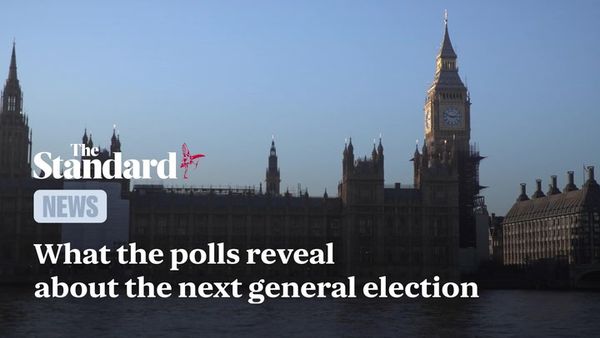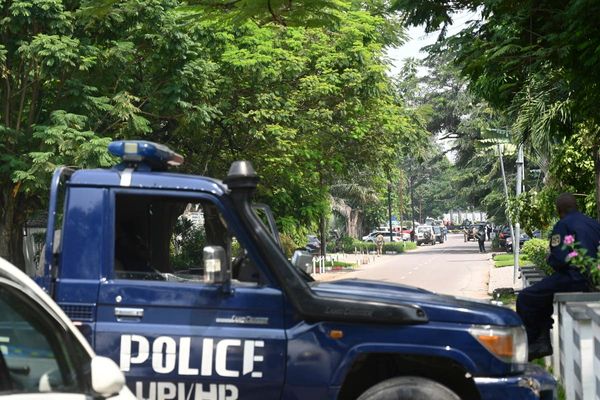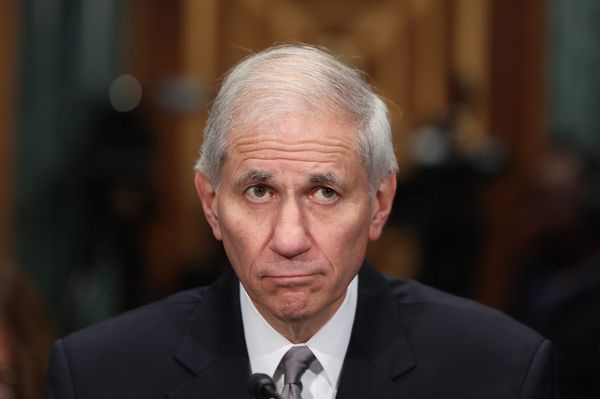
Donald Trump is the first US president to be tried on criminal charges – and could face prison if convicted. Trump allegedly falsified the financial transaction behind the $130,000 hush-money payment to adult film star Stormy Daniels. He denies 34 felony counts of falsifying business records in spring 2023.
Here’s what you need to know about the case:
20 May: what happened today
Donald Trump was joined in court by his son Eric and allies South Carolina attorney general Alan Wilson, Missouri congressman Eric Burlison, Texas congressman Keith Self, former New York police commissioner Bernie Kerik, real estate investor Steve Witkoff, former Georgia state legislator Vernon Jones, chair of the New York state Conservative party Jerry Kassar, actor Chuck Zito as well as retired Harvard law professor Alan Dershowitz and Will Scharf, both of whom have served as the former president’s lawyers.
Michael Cohen, Donald Trump’s former fixer and lawyer, completed his testimony on Monday. Cohen testified that he knew the $130,000 hush-money payment to the adult film star Stormy Daniels violated election law – even though he claimed otherwise in a 2018 letter. Cohen’s testimony implicated that Trump, by extension, must also have believed that the money violated the Federal Election Campaign Act (which caps individual contributions to campaigns at $2,000 a year) since it was to influence the outcome of the 2016 election.
Cohen’s testimony marked an important moment as it was the closest the prosecution has come to tying Trump to the alleged falsification of business records with an intent to commit a second crime – in this case, violating federal campaign contributions law.
The prosecution also attempted to undercut the Trump defense team’s contention that Cohen had a track record of lying whenever it suited his needs, such as when he lied to a federal judge in 2018 that he was not pressured into pleading guilty to tax evasion – which he later disavowed.
The pushback from prosecutors came after Trump’s lead defense lawyer, Todd Blanche, suggested that Cohen and the former Trump Organization chief financial officer Allen Weisselberg between themselves devised a complicated scheme to repay Cohen of the Daniels hush money and other expenses that came from his own pocket – but Trump himself.
The defense also suggested that Cohen concocted the idea to “gross up” the repayment, which prosecutors have said Trump approved and violated state tax law, in order to increase the amount of money he got from the Trump Organization in 2016, after his bonus was lower than in 2015. “So you stole from the Trump Organization?” Blanche asked, his voice reaching a crescendo. “Yes, sir”, Cohen conceded.
After Cohen left the witness stand, prosecutors rested their case and Trump’s lawyers began calling witnesses of their own: paralegal Daniel Sitko, and Robert Costello, a former federal prosecutor who has publicly blasted Cohen. Costello had offered to represent Cohen soon after his hotel room, office and home were raided.
Costello testified that Cohen told him “numerous times” that Trump “knew nothing” about the $130,000 hush money payment to Daniels.
Judge Juan Merchan briefly closed the courtroom and forcer reporters out after he admonished Costello for his behavior on the witness stand. Addressing Costello, the judge said: “If you don’t like my ruling, you don’t say ‘jeez’ ... You don’t give me side eye, and you don’t roll your eyes.”
Trump’s lawyers are separately considering whether to call a federal elections law witness, Bradley Smith, as they seek to make the case that campaign contribution rules are complex and that Trump did not have the necessary intent to violate the contribution limits when he allegedly falsified business records.
Costello will resume his testimony when court resumes on Tuesday morning. Trump will have to decide whether to testify in his own defense. Legal experts have widely suggested Trump testifying would almost certainly be a mistake, given his track record of making self-incriminating comments.
Merchan still needs to decide whether he will issue jury instructions, and what form they might take. As a result, even if Trump does not testify, closing arguments are not expected to come until Tuesday, 28 May.
Key characters and facts
Trump hush-money trial status: Trump pleaded not guilty; the trial began on 15 April 2024.
Charges: 34 felony charges of falsifying business records.
Hush-money case summary: The case involves a hush-money scheme during the 2016 presidential election. Trump’s former lawyer Michael Cohen paid $130,000 to the adult film star Stormy Daniels to quash her story about an alleged extramarital affair with the former president. Trump has denied the affair took place. Prosecutors accuse the former president of illegally reimbursing Cohen for the hush-money payment by falsely classifying the transaction, executed by the Trump Organization, as legal expenses.
Verdict before election? Likely.
Key moments in the trial so far
14 May: Michael Cohen, the star witness in the hush-money trial, walked through key elements of the case as defense lawyers sought to undermine his credibility.
13 May: Michael Cohen testified that Trump had been intimately involved in the hush-money deal and received real-time updates on Stormy Daniels.
10 May: Trump appeared frustrated in court while possible Cohen testimony loomed.
9 May: Trump attorneys sought to cast doubt on the account of the alleged tryst – but Stormy Daniels refused to concede any inconsistencies.
7 May: Stormy Daniels undercut some of Trump’s defenses as his lawyer suggested Danield has a propensity to embellish.
6 May: Prosecutors moved on to the alleged falsification of business records to cover up hush-money payments to Stormy Daniels, after previously calling witnesses who described a conspiracy to kill the story.
3 May: Hope Hicks took the stand, describing 2016 Trump campaign staffers’ panic when a recording emerged in which Trump bragged about groping women and the former president’s complete control over the campaign.
2 May: Keith Davidson, a lawyer who negotiated payments, testified.
30 April: Trump is fined $9,000 over gag order violations as the judge warned of jail time.
26 April: Pecker’s testimony presented a granular look into a hush-money scheme that prosecutors allege was meant to sway the 2016 election in the real estate mogul’s favor.
25 April: Pecker testified about his role in buying a story from the model Karen McDougal about an alleged affair with Trump.
23 April: David Pecker, the National Enquirer publisher, said he was Trump’s “eyes and ears” during the 2016 election campaign.
22 April: In its opening statement, the prosecution said Trump “orchestrated a criminal scheme to corrupt the 2016 presidential election” in his efforts to cover up an alleged affair with the adult film star Stormy Daniels.
19 April: The court finally chose all 18 jurors.
18 April: Twelve jurors were selected after two seated jurors were removed earlier in the day.
15 April: Trump’s hush-money trial began. He is the country’s first president to face a criminal trial.







